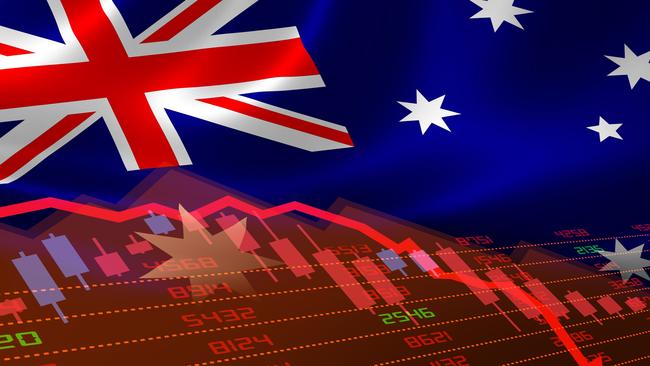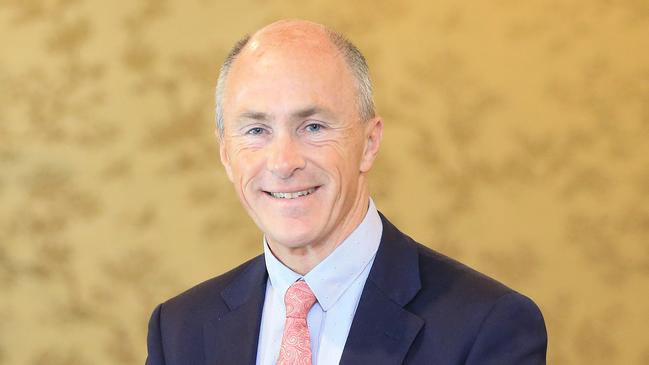World Bank warns global economy at risk of recession in 2023 and what it means for Australia
The World Bank has warned the global economy is at risk of recession this year, with fears Australia will be plunged into financial stress. We asked two leading experts what it means for you.
National
Don't miss out on the headlines from National. Followed categories will be added to My News.
The World Bank has sent a grim warning that the global economy is close to falling into recession, with fears Australia may also be plunged into financial stress.
In a new report, the bank said skyrocketing cost of living, higher interest rates and disruptions caused by Russia’s invasion of Ukraine has led to the “fragile” economic conditions and could prompt a second recession within the space of just three years.
And while a mild recession in major economies such as the US, UK, Europe and Japan has been forecast by commentators for some time, very few economists in Australia are forecasting a recession.

However, some warn there will be “difficult times” and households will be affected.
So where does Australia stand?
The Australian Reserve Bank forecasts the rate of inflation to fall to 4.7 per cent by the end of 2023, before easing further to just over its targeted 2 to 3 per cent by the end of the next year.
News Corp spoke to CommSec’s chief economist Craig James and Brodie Haupt, co-founder of digital lending platform WLTH, about what a recession would mean for Australia and what to expect.
WHAT IS A RECESSION?
A recession is generally when a country’s economy declines, according to the RBA website.
Economists can’t label it a recession if the Australian stock market has one bad day – you need two successive quarters where Australia‘s gross domestic product (GDP) has fallen.
IS A GLOBAL RECESSION UNAVOIDABLE?
CommSec’s Craig James said it would be difficult to avoid a global recession.
“Slower growth is generally anticipated but much depends on inflation trends and interest rates,” Mr James said.
“If inflation moderates quicker than assumed over 2023 then rates won’t need to rise as high as anticipated and economic activity can lift,” he said.

The World Economic Forum (WEF)’s Global Risks Report 2023 released this week found Australia will face greater risks around “rivalries for natural resources” as a worldwide demand-supply gap grows, particularly for finite critical metals and minerals of which the country is a global supplier.
The report predicts that by 2050, demand for graphite, lithium, and cobalt will soar to 450 per cent of 2018 production levels.
Chief executive officer of WLTH, Brodie Haupt, said it’s “difficult” to say if a global recession is unavoidable, as economic conditions and events can change rapidly and unpredictably.
“Factors such as changes in government policies, natural disasters, and global events can all have a significant impact on the global economy,” he said.

“Many economies around the world, including Australia are experiencing a rise in interest rates for the first time in years, and there is usually a lag before the reduction in spending takes effect to reduce inflation.
“There are also many economic and political actions that governments and organisations can take to try to prevent or mitigate the effects of a recession. Governments can implement fiscal policies, such as increasing spending on infrastructure projects or providing financial assistance to individuals and businesses, to help boost economic activity,” he said.
WILL AUSTRALIA GO INTO RECESSION?
While Mr James says there is a “low chance” of Australia falling into recession, Mr Haupt believes it is possible that Australia could experience a recession.
He said any country’s economy is subject to a “range of internal and external factors” that can “cause growth to slow or contract”.
“However, the likelihood of a recession and its potential severity would depend on a variety of factors specific to the Australian economy,” he said.”
“As a country with a strong and stable banking system, low public debt, in comparison to other advanced countries, and somewhat strong fiscal position, Australia’s economy had been showing a good performance.
“But current challenges such as fall in commodity prices, decline in consumption and slower growth in China and India, could cause negative impacts on the economy of the country. It is difficult to predict with certainty if or when a country will enter a recession as the economic performance could change over time.”
Their comments come after a Deutsche Bank prediction in November that Australia will enter into a recession this year.
The RBA’s unemployment rate forecast for the end of 2023 is significantly below that at 3.7 per cent.
“We expect Australia’s unemployment rate to end 2023 at 4.5 per cent, that is, one percentage point higher than the current unemployment rate at 3.5 per cent,” Deutsche Bank chief economist Phil O’Donoghoe said.
HOW WILL AUSTRALIA BE AFFECTED BY A RECESSION?
Both Mr James and Mr Haupt said while Australia was less likely to experience a recession, slower demand in other parts of the globe can affect Australian exporters.
“A recession in Australia would have a wide range of impacts on the country as a whole and on individuals. Some potential impacts includes a decrease in economic growth, as businesses may struggle to maintain profits and consumers may reduce their spending,” Mr Haupt said.
“Also businesses struggle during a recession, they may have to cut costs by laying off employees, leading to an increase in unemployment.
“A recession can lead to businesses shutting down because of lack of sales, this can lead to less investment, less job opportunities and increase in poverty.”
Mr Haupt said a recession could lead to a decrease in stock prices, which then can lead to a “decrease in wealth” for individuals and organisations that own stocks.
He said the housing market would also be impacted, with housing prices and housing construction decreasing, which would negatively impact the construction and real estate industries.
“Also, a recession can lead to a decrease in tax revenue, which could make it more difficult for governments to fund public services and infrastructure projects,” Mr Haupt said.
HOW HAVE INTEREST RATES IMPACTED AUSSIES?
The latest figures released by the Australian Bureau of Statistics on Wednesday revealed inflation is up to a 30-year-high.
Treasurer Jim Chalmers said the latest figures “underscores the pressure being felt throughout our economy and the pinch being felt by Australian households”.
“The November result doesn’t fully include the latest energy prices that are a direct result of nine months of Russian aggression and nine years of Coalition incompetence,” he said.
“There is also uncertainty around the impacts of ongoing flooding that continues to devastate communities across our country.”
Dr Chalmers said the data comes amid the World Bank global recession warning.
“This report leaves little to no doubt the international economy is facing its third crisis in 15 years – following the hammer blows caused by the GFC and pandemic,” Dr Chalmers said.
“We should be optimistic about the future of our economy and our country, but realistic about what the deteriorating international outlook means for us in Australia.”
HOW CAN WE STOP OR SLOW THE RECESSION DOWN?
Mr James said the aim will be to “lift interest rates” and slow down spending.
“Greater balance between supply and demand control will restrain inflation. The hard part is getting the level of interest rates right,” he said.
“Too aggressive monetary policy could lead to recession.
“Not aggressive enough monetary policy may fail to get inflation down. It’s a difficult balancing act.”
Mr Haupt said there are a number of policies and actions that governments and organisations can take to try to prevent or slow down a recession.
However, he said it’s important to note that the effectiveness of these policies and actions depend on a variety of factors such as timing and execution, and it’s “difficult to know for sure how much of an impact they will have in preventing or slowing down the recession”.
“Central banks can implement monetary policy measures such as cutting interest rates or quantitative easing to make borrowing cheaper and more attractive, which can stimulate economic growth,” he said.
“Governments can implement fiscal policy measures such as increasing government spending, providing tax breaks, or providing financial assistance to individuals and businesses to try to boost economic activity.
“They can also invest in infrastructure projects, such as building new roads, bridges, or public transportation systems, to create jobs and stimulate economic growth.
“Governments can negotiate trade agreements or adjust tariffs to open new markets for their businesses and promote economic growth.
“And providing support and grants to small businesses so they can sustain their operations, can help in keeping the recession mild.”





